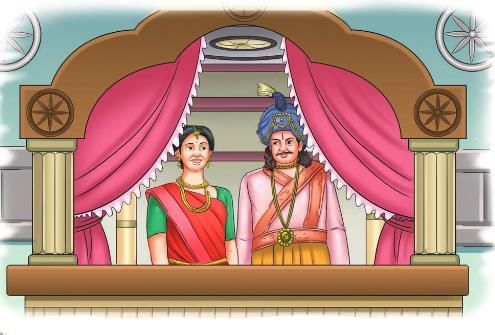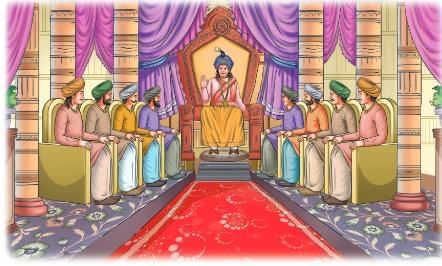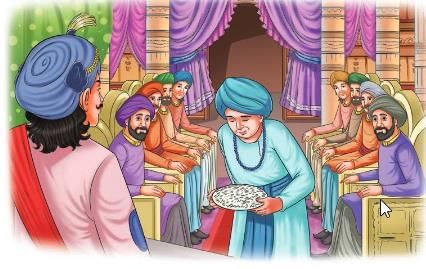Short & Long Answer Questions: The Wit that Won Hearts | English Poorvi Class 8 - New NCERT PDF Download
Short Answer Questions
Q1. What made the Vijayanagara Empire famous during Krishnadeva Raya’s reign?
Ans: The Vijayanagara Empire was famous for its immense wealth, splendor, and cultural achievements under Krishnadeva Raya. His reign, known as the Golden Era, saw remarkable progress in art, literature, and architecture. The empire became a hub for creativity, attracting scholars, poets, and artists. This period marked a peak in the empire’s prosperity and cultural brilliance.
Q2. What kind of warrior was Krishnadeva Raya known to be?
Ans: Krishnadeva Raya was renowned as a formidable and skilled warrior who led his army with great courage. His strategic abilities in battles strengthened the Vijayanagara Empire. He was respected for his bravery and leadership on the battlefield. His military successes helped protect and expand the empire’s territories.
Q3. Besides being a king, what other talents did Krishnadeva Raya have?
Ans: Krishnadeva Raya was not only a ruler but also a highly talented poet and scholar. He wrote significant works like the epic Amuktamalyada and the Sanskrit play Jambavati Parinayam. As a patron of learning, he supported scholars and artists in his court. His contributions enriched the cultural landscape of his empire.
Q4. Who were the Ashtadiggajas in Krishnadeva Raya’s court?
Ans: The Ashtadiggajas were a group of eight distinguished poets in Krishnadeva Raya’s royal court. They included renowned figures like Allasani Peddana and Tenali Ramakrishna, known for their literary brilliance. These poets contributed significantly to the empire’s rich literary tradition. Their works added to the cultural prestige of the Vijayanagara Empire.

Q5. Why did Thirumalambal feel heartbroken after the quarrel?
Ans: Thirumalambal felt heartbroken because Krishnadeva Raya stopped speaking to her after their disagreement. The king’s refusal to communicate left her deeply saddened and isolated. Her repeated attempts to mend their relationship were unsuccessful, increasing her distress. The once-lively palace became quiet, reflecting her emotional turmoil.
Q6. What did Thirumalambal tell Tenali about the king’s poem?
Ans: Thirumalambal told Tenali that the king’s poem was about the sun, moon, and stars but was difficult to understand. She mentioned that the ministers avoided giving honest feedback, which frustrated the king. When she yawned during his recitation, he felt disrespected and left angrily. This misunderstanding led to their prolonged quarrel.
Q7. How was the royal court described when Tenali presented his plan?
Ans: The royal court was described as a grand hall adorned with intricately carved pillars and illuminated by sunlight streaming through large windows. It was bustling with ministers and scholars engaged in lively discussions. The atmosphere was vibrant, despite the underlying tension from the king’s quarrel. The court’s magnificence reflected the empire’s wealth and grandeur.
Q8. What were the ministers discussing in the court before Tenali spoke?
Ans: The ministers were discussing practical ways to improve paddy cultivation in the empire. They proposed solutions like expanding irrigation systems to ensure better water supply. They also suggested using improved manure to enhance crop yields. These discussions aimed to boost agricultural productivity for the empire’s benefit.

Q9. How did the king initially react to Tenali’s claim about the paddy seeds?
Ans: Krishnadeva Raya was highly skeptical when Tenali claimed the paddy seeds could triple the harvest. He dismissed the idea as absurd, believing it was unrealistic. The king argued that such a yield would require specialized soil and advanced pest control. His reaction showed his practical approach to agricultural challenges.
Q10. What happened in the court when Tenali mentioned yawning?
Ans: When Tenali mentioned yawning, the court burst into laughter, easing the earlier tension. The king, caught off guard, yawned instinctively, which surprised everyone present. This moment prompted him to reflect on his misunderstanding with Thirumalambal. The laughter created a lighter mood, helping to shift the king’s perspective.
Q11. What did Krishnadeva Raya say to Thirumalambal to resolve their quarrel?
Ans: Krishnadeva Raya approached Thirumalambal with a sincere apology, admitting he had been foolish. He acknowledged that his pride had blinded him, causing him to misjudge her yawning. He expressed deep regret for his actions and the pain he caused. His heartfelt words helped mend their relationship.
Q12. How did the royal couple show their gratitude to Tenali Rama?
Ans: The royal couple showed their gratitude by showering Tenali Rama with valuable gifts for his cleverness. Their appreciation restored joy and laughter to the palace, making it vibrant again. Tenali’s witty tactic not only resolved their quarrel but also strengthened their trust in him. The palace returned to its lively and harmonious state.

Long Answer Questions
Q1. How did Tenali Ramakrishna’s role as an advisor influence the Vijayanagara Empire’s court?
Ans: Tenali Ramakrishna played a crucial role in the Vijayanagara Empire's court as both a poet and a clever advisor. His sharp wit and problem-solving abilities made him a trusted confidant to King Krishnadeva Raya. For instance, he successfully resolved a quarrel between the royal couple using a thoughtful strategy, demonstrating his skill in managing delicate situations. His presence brought both humour and wisdom to the court, helping to lighten the atmosphere during tense moments. Tenali's clever interventions often transformed serious discussions into opportunities for reflection and unity. By addressing issues like the king's misunderstandings with the queen, he played a significant role in strengthening the court's harmony. Beyond his poetic contributions, Tenali helped maintain a positive atmosphere in the palace. His unique ability to blend intelligence with diplomacy made him an indispensable figure in the empire, showcasing how a wise advisor can influence the dynamics of a royal court.
Q2. What does the story reveal about the importance of communication in resolving conflicts?
Ans: The story highlights that clear communication is vital for resolving conflicts, as illustrated by the quarrel between Krishnadeva Raya and Thirumalambal. The king's silence, stemming from a misinterpretation of the queen's yawning, led to a prolonged rift that created tension in the palace. Thirumalambal's attempts to explain her actions were unsuccessful because the king was initially unwilling to engage in dialogue. It was Tenali Ramakrishna's clever tactic in court that prompted the king to reflect on his mistake, paving the way for communication. When Krishnadeva Raya finally apologised and spoke to the queen, their relationship was restored. This story illustrates that misunderstandings can escalate without communication, but honest conversations can mend relationships. Tenali's strategy encouraged the king to express regret, proving that communication is essential for resolving disputes. This lesson emphasises the importance of listening and speaking openly to maintain harmony.
Q3. How did the court’s atmosphere reflect the challenges faced by Krishnadeva Raya?
Ans: The atmosphere of the royal court reflected the challenges faced by Krishnadeva Raya, particularly his personal conflict with Thirumalambal. Although discussions on agricultural improvements were lively, a sense of tension lingered due to the king's troubled mood. His stern expression while seated on the throne demonstrated how his personal issues impacted his leadership. The court, typically a vibrant space for debate, felt strained, mirroring the emotional burden of the royal quarrel. Tenali Ramakrishna provided a humorous distraction with his paddy seeds, which lightened the atmosphere but also underscored the king's distraction. This situation illustrates that a ruler's personal challenges can significantly affect the dynamics of the court and influence decision-making. Once the quarrel was resolved, the court regained its joyful energy, highlighting the connection between the king's state of mind and the court's atmosphere. This scenario exemplifies how a leader's personal and professional responsibilities are intertwined.
Q4. Why was Tenali Ramakrishna’s approach to solving the royal quarrel considered clever?
Ans: Tenali Ramakrishna's approach was clever because he employed a subtle and humorous strategy to address the king's misunderstanding without direct confrontation. Rather than openly discussing the quarrel, he presented a plate of paddy seeds, claiming they could triple the harvest, which captured the court's attention. By linking careless sowing to yawning, he indirectly referenced the queen's action, prompting the king to reflect on his own behaviour. This method avoided embarrassing the king while encouraging self-realisation. Tenali's tactic was effective because it used humour to diffuse tension and foster introspection. His indirect approach ensured the king understood his mistake without feeling criticised. The cleverness of his strategy lay in blending wit with wisdom, ultimately resolving the conflict peacefully. As a result, harmony was restored, earning him the gratitude of the royal couple.

Q5. How did the king’s pride contribute to the conflict with Thirumalambal?
Ans: Krishnadeva Raya's pride significantly escalated the conflict with Thirumalambal. When the queen yawned during his poem recitation, he took it as a sign of disrespect, allowing his pride to cloud his judgment. Rather than addressing his feelings, he chose to ignore her, which prolonged their quarrel. His pride was rooted in his identity as both a poet and a ruler, making him sensitive to any perceived slights. This led to weeks of silence, creating a tense atmosphere in the palace. Fortunately, Tenali's intervention helped the king realise that his pride had blinded him to the queen's exhaustion. By acknowledging his mistake, the king was able to overcome his pride and restore their relationship. This story illustrates how pride can lead to unnecessary conflicts, while humility can pave the way for resolution.
Q6. What role did humor play in Tenali Ramakrishna’s strategy to resolve the conflict?
Ans: Humor played a crucial role in Tenali Ramakrishna's strategy to resolve the conflict between the king and queen. By introducing the concept of paddy seeds and connecting yawning to careless sowing, he created a humorous situation that made the court laugh. This laughter helped to ease the tension, allowing the king to yawn instinctively and reconsider his earlier misunderstanding. Tenali's clever use of humour turned a serious issue into a chance for healing and reconciliation. His approach illustrated how light-heartedness can effectively address misunderstandings and restore harmony.
Q7. How did the resolution of the royal couple’s quarrel impact the Vijayanagara Empire’s palace?
Ans: The resolution of the quarrel between Krishnadeva Raya and Thirumalambal significantly transformed the atmosphere of the Vijayanagara Empire palace. Previously, the palace was quiet and gloomy due to their conflict, but with the king's heartfelt apology and the queen's readiness to reconcile, harmony was restored. This positive shift not only strengthened their relationship but also uplifted the mood of the court. The return of laughter and unity revitalised the palace, creating a more productive environment. Tenali's clever intervention in resolving the dispute earned him valuable gifts, which further enhanced the morale of the court. This incident underscored the crucial role of a peaceful royal household in maintaining the stability of the empire. It illustrated how personal reconciliations can positively influence the overall dynamics within the palace.
Q8. What lesson can be learned from Tenali Ramakrishna’s ability to observe and strategize?
Ans: Tenali Ramakrishna’s ability to observe and strategise highlights the significance of patience and careful planning in problem-solving. In the story, he attentively listened to Thirumalambal’s concerns and requested time to formulate a plan. His quiet observation in the court enabled him to assess the king’s mood and the dynamics among the courtiers. By crafting a strategy that incorporated humour and an agricultural metaphor, he effectively subtly addressed the issue. This demonstrates that careful observation is crucial for understanding the root of a problem, while strategic thinking leads to solutions that consider the feelings of all parties involved. Tenali’s success underscores the value of thinking before acting, particularly in sensitive situations. His approach ensured that the king’s pride was preserved, resulting in a peaceful resolution. This lesson encourages thoughtful problem-solving in challenging scenarios.
|
59 videos|434 docs|57 tests
|
FAQs on Short & Long Answer Questions: The Wit that Won Hearts - English Poorvi Class 8 - New NCERT
| 1. What is the main theme of "The Wit that Won Hearts"? |  |
| 2. Who are some notable figures discussed in the article, and what are their contributions? |  |
| 3. How does the article illustrate the relationship between wit and social interaction? |  |
| 4. Can you provide examples of how wit has been used effectively in literature? |  |
| 5. What lessons can readers take away from "The Wit that Won Hearts"? |  |






















